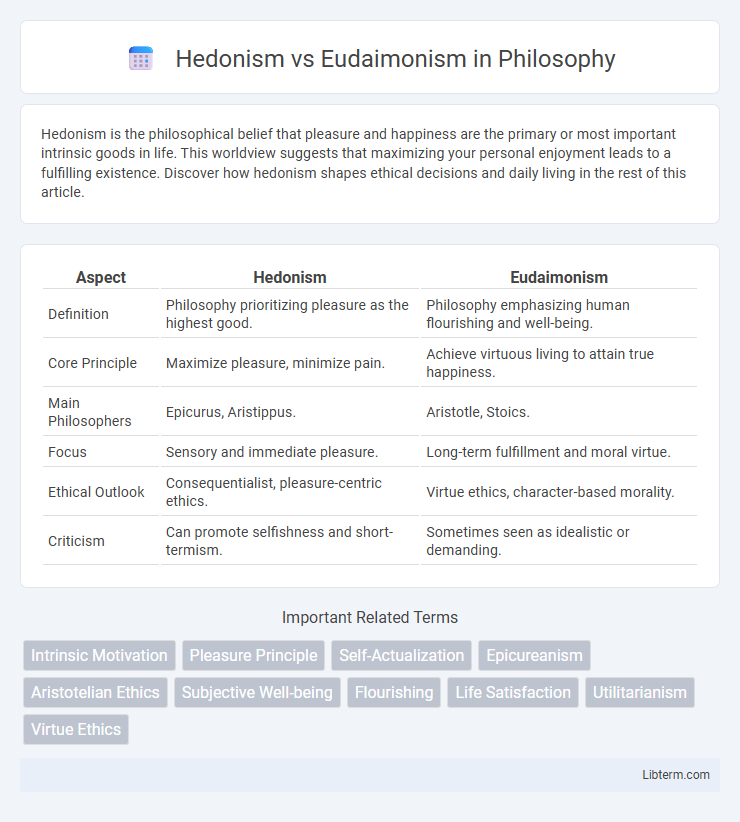Hedonism is the philosophical belief that pleasure and happiness are the primary or most important intrinsic goods in life. This worldview suggests that maximizing your personal enjoyment leads to a fulfilling existence. Discover how hedonism shapes ethical decisions and daily living in the rest of this article.
Table of Comparison
| Aspect | Hedonism | Eudaimonism |
|---|---|---|
| Definition | Philosophy prioritizing pleasure as the highest good. | Philosophy emphasizing human flourishing and well-being. |
| Core Principle | Maximize pleasure, minimize pain. | Achieve virtuous living to attain true happiness. |
| Main Philosophers | Epicurus, Aristippus. | Aristotle, Stoics. |
| Focus | Sensory and immediate pleasure. | Long-term fulfillment and moral virtue. |
| Ethical Outlook | Consequentialist, pleasure-centric ethics. | Virtue ethics, character-based morality. |
| Criticism | Can promote selfishness and short-termism. | Sometimes seen as idealistic or demanding. |
Understanding Hedonism: The Pursuit of Pleasure
Hedonism is a philosophical theory asserting that pleasure or happiness is the highest good and primary motivation of human life. It emphasizes the pursuit of sensory enjoyment, comfort, and the avoidance of pain as essential components of well-being. Psychological hedonism, a variant, suggests that individuals naturally seek to maximize pleasure and minimize suffering in their actions.
Defining Eudaimonism: The Quest for Flourishing
Eudaimonism centers on achieving human flourishing through virtuous living and realizing one's full potential, emphasizing long-term well-being rather than immediate pleasure. Rooted in Aristotelian ethics, eudaimonia involves cultivating moral strengths, practical wisdom, and meaningful life goals to foster holistic happiness. This approach contrasts with hedonism by prioritizing sustained fulfillment and personal growth over transient sensory delights.
Historical Roots: From Ancient Greece to Modern Thought
Hedonism, rooted in the teachings of ancient Greek philosophers like Aristippus, emphasizes pleasure as the highest good, while Eudaimonism, championed by Aristotle, centers on the pursuit of flourishing and virtuous living as the path to true happiness. Both philosophies have evolved through Roman Stoicism and Enlightenment thinkers, influencing modern ethical debates by contrasting immediate gratification with long-term fulfillment. Their historical trajectories highlight foundational questions about human well-being and the nature of a meaningful life.
Key Philosophers: Epicurus vs. Aristotle
Epicurus, a key hedonist philosopher, emphasized pleasure as the highest good, advocating for simple pleasures and the absence of pain to achieve tranquility (ataraxia). Aristotle, central to eudaimonism, argued that eudaimonia (flourishing or well-being) results from living virtuously in accordance with reason, highlighting moral and intellectual virtues. Their contrasting views define hedonism as pleasure-focused ethics, while eudaimonism centers on fulfilling human potential through virtuous activity.
Core Principles: Pleasure vs. Purpose
Hedonism emphasizes maximizing immediate pleasure and minimizing pain as the primary goal of life, valuing sensory enjoyment and happiness. Eudaimonism centers on achieving a deeper sense of purpose and flourishing through virtuous living and meaningful activities that contribute to long-term well-being. The core distinction lies in Hedonism's focus on transient pleasure versus Eudaimonism's emphasis on sustained fulfillment through personal growth and ethical conduct.
Measuring The Good Life: Happiness or Meaning?
Measuring the good life through hedonism centers on maximizing pleasure and minimizing pain, considering happiness as the ultimate indicator of well-being. In contrast, eudaimonism emphasizes living in accordance with virtue and realizing one's potential, defining a meaningful life beyond transient pleasures. Contemporary positive psychology often integrates both, assessing well-being through subjective happiness measures and a sense of purpose or meaning.
Societal Impacts: Cultural Attitudes Toward Well-Being
Hedonism emphasizes immediate pleasure and personal satisfaction, often fostering cultures that prioritize consumerism and individual gratification, which can lead to increased materialism and reduced community cohesion. Eudaimonism, grounded in virtue and meaningful living as espoused by Aristotle, promotes societal values of long-term fulfillment, moral development, and communal welfare, encouraging stronger social bonds and collective well-being. Cultural attitudes influenced by these philosophies shape public policy and social norms, impacting mental health, social trust, and the balance between individual rights and social responsibilities.
Critiques and Limitations: Hedonism and Eudaimonism Compared
Hedonism faces critiques for its reduction of well-being to mere pleasure, often neglecting long-term fulfillment and moral dimensions. Eudaimonism is limited by its reliance on subjective interpretations of flourishing, which can vary across cultures and individuals, complicating universal application. Both philosophies struggle with balancing individual desires against broader ethical considerations, highlighting tensions between transient satisfaction and holistic human development.
Modern Interpretations: Positive Psychology Perspectives
Modern interpretations of hedonism and eudaimonism in positive psychology emphasize subjective well-being and flourishing, respectively. Hedonism centers on the pursuit of pleasure and the avoidance of pain as key components of happiness, while eudaimonism emphasizes meaning, self-realization, and personal growth. Contemporary research often integrates these perspectives, highlighting the balance between immediate satisfaction and long-term fulfillment for optimal mental health.
Choosing Your Path: Practical Applications for Daily Life
Hedonism emphasizes maximizing pleasure and minimizing pain, guiding individuals to seek immediate happiness through sensory experiences, while Eudaimonism focuses on achieving long-term fulfillment by cultivating virtues and personal growth. In daily life, choosing between these paths involves balancing short-term enjoyment with meaningful activities that promote well-being, such as mindfulness, goal-setting, and ethical decision-making. Practical applications include prioritizing healthy habits, nurturing relationships, and engaging in purposeful work that aligns with individual values and fosters sustained contentment.
Hedonism Infographic

 libterm.com
libterm.com